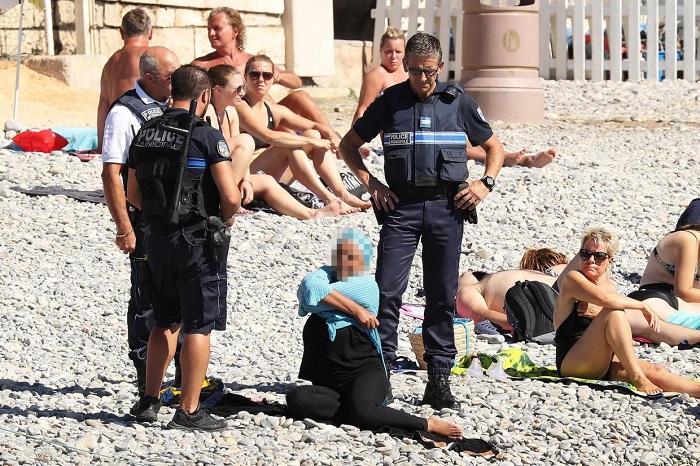This week, the ‘burkini’ was thrown into spot light once again when a Muslim woman was forced to undress by French police as she enjoyed the beach with other beach goers in Nice. Using language similar to the bans imposed in a string of other resorts on the French Riviera, the city barred clothing that “overtly manifests adherence to a religion at a time when France and places of worship is the target of terrorist attacks.” While many describe the incident as islamophobic, many too have voiced concern that the actions of the police perpetuate the fallacy that males hold authority over every aspect of a female’s existence.
Islamic dress has long been a subject of debate in France, which was the first European country to ban the niqab, or full-face veil, in 2010. This ban came six years after outlawing the headscarf and other conspicuous religious symbols in state schools.
Speaking to VOC, international human rights jurist Rim-Sarah Alouane explains that while Muslim women have been the target of the French curtail of anti-religious symbols, she recently encountered a nun who confidently ventured through the streets donned in her habit.
Alouane, who is also a Ph.D. candidate in public law researching religious freedom and civil liberties, says that while Islamic garb of females has attacked much debate, French law does not prohibit the expression of religion in the public sphere.
In light of the radical doctrine taught by extremist groups, such as ISIS, Alouane asserts that those who wear Burkini’s are likely not part of or supporters of extremist groups.
She further notes that the current anti-Muslim rhetoric spreading throughout Europe, only acts in the favour of ISIS, who appears to be working to entrench social division globally.
“French Muslims are French and we need to embrace and accept the fact,” Alouane continued.
While the creator of the burkini developed the garment in a bid to reconcile her faith with the freedom to enjoy public spaces while dressed modestly, she says that many non-Muslim women have opted to don the swimming gear to protect their skin against the harsh raise of the sun.
“Burkini’s are literally a wet suit, created in Australia. So, it is western attire and it’s not only Muslims who wear it,” Alouane stated.
She says that though the recent Burkini incident highlighted the role of religious suppression within France, the punting of secular ideologies stretches as far back to the 1990’s with the prevention of the head scarf within schools.
Describing the Burkini incident as the “Trojan Horse”, Alouane says that the banning of the outfit is simply one step in the battle to suppress the growth of Islam within France.
Given recent attacks in France, she says that French society appears to be divided; the pro and anti-Burkini.
“This is dangerous, since we are in a time when we need to show unity, solidarity and stand by our core principles; liberty, equality, and fraternity. Here the authorities are dividing the people – but hey, presidential elections are coming,” she noted.
Alouane says that the French authorities’ obsession with suppressing religious freedom comes at a time when the political and economic climate requires much attention.
She explains that the fight against the control of ‘the female’ within society, by male counterparts, appears to not extend to the Muslim female.
“Nobody seems to care about women’s rights when it’s about targeting Muslims. It is no longer a taboo to be anti-Muslim.”
VOC






 WhatsApp us
WhatsApp us 

